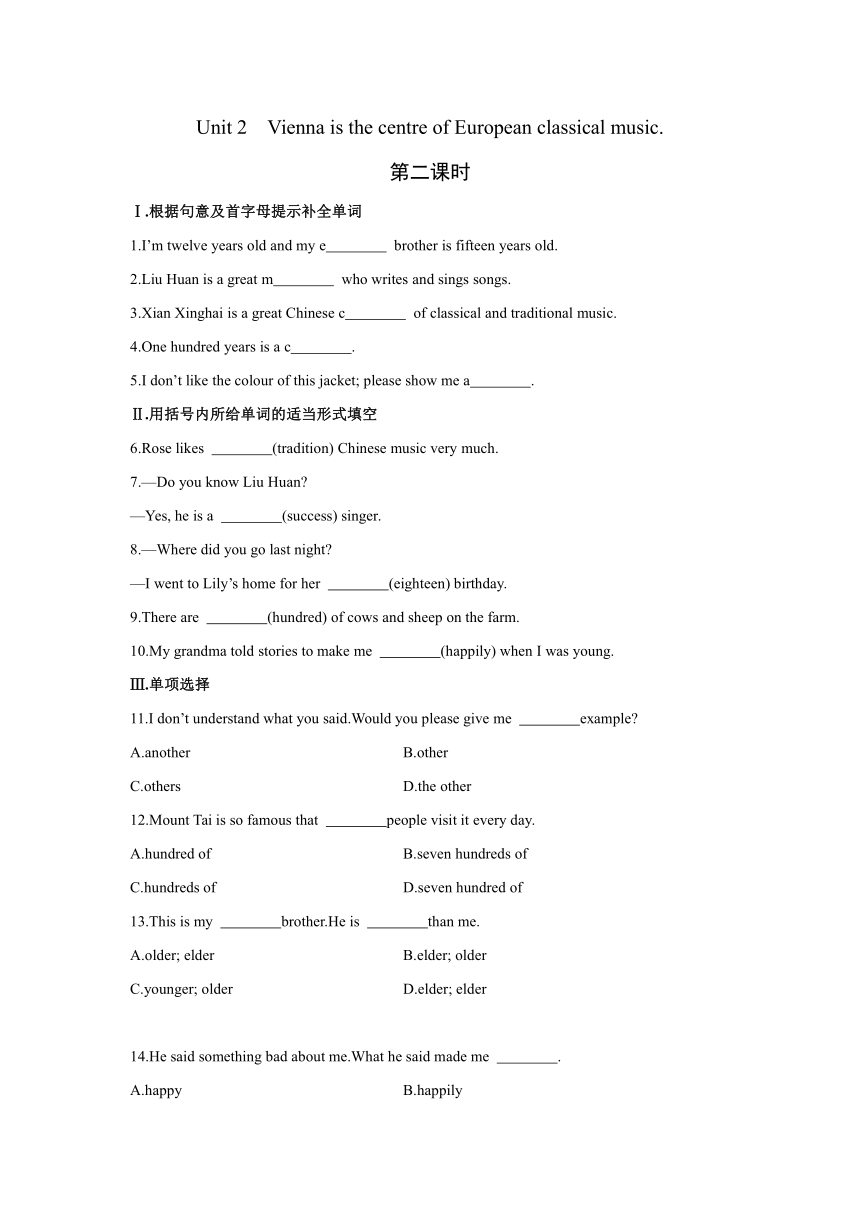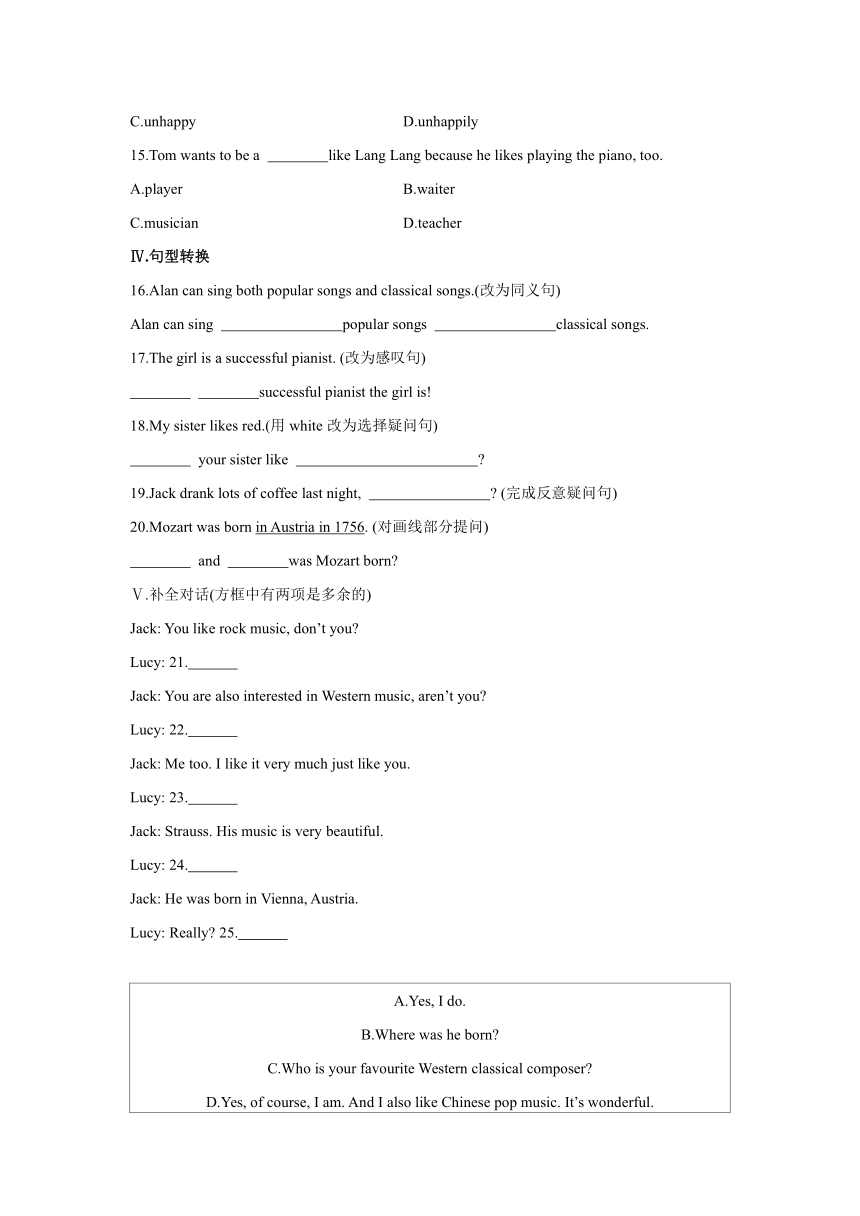外研版英语七年级下册课时练习Module 12 Western music Unit 2 Vienna is the centre of European classical music.第二课时(含
文档属性
| 名称 | 外研版英语七年级下册课时练习Module 12 Western music Unit 2 Vienna is the centre of European classical music.第二课时(含 |

|
|
| 格式 | docx | ||
| 文件大小 | 47.5KB | ||
| 资源类型 | 教案 | ||
| 版本资源 | 外研版 | ||
| 科目 | 英语 | ||
| 更新时间 | 2022-04-03 00:00:00 | ||
图片预览


文档简介
Unit 2 Vienna is the centre of European classical music.
第二课时
Ⅰ.根据句意及首字母提示补全单词
1.I’m twelve years old and my e brother is fifteen years old.
2.Liu Huan is a great m who writes and sings songs.
3.Xian Xinghai is a great Chinese c of classical and traditional music.
4.One hundred years is a c .
5.I don’t like the colour of this jacket; please show me a .
Ⅱ.用括号内所给单词的适当形式填空
6.Rose likes (tradition) Chinese music very much.
7.—Do you know Liu Huan
—Yes, he is a (success) singer.
8.—Where did you go last night
—I went to Lily’s home for her (eighteen) birthday.
9.There are (hundred) of cows and sheep on the farm.
10.My grandma told stories to make me (happily) when I was young.
Ⅲ.单项选择
11.I don’t understand what you said.Would you please give me example
A.another B.other
C.others D.the other
12.Mount Tai is so famous that people visit it every day.
A.hundred of B.seven hundreds of
C.hundreds of D.seven hundred of
13.This is my brother.He is than me.
A.older; elder B.elder; older
C.younger; older D.elder; elder
14.He said something bad about me.What he said made me .
A.happy B.happily
C.unhappy D.unhappily
15.Tom wants to be a like Lang Lang because he likes playing the piano, too.
A.player B.waiter
C.musician D.teacher
Ⅳ.句型转换
16.Alan can sing both popular songs and classical songs.(改为同义句)
Alan can sing popular songs classical songs.
17.The girl is a successful pianist. (改为感叹句)
successful pianist the girl is!
18.My sister likes red.(用white改为选择疑问句)
your sister like
19.Jack drank lots of coffee last night, (完成反意疑问句)
20.Mozart was born in Austria in 1756. (对画线部分提问)
and was Mozart born
Ⅴ.补全对话(方框中有两项是多余的)
Jack: You like rock music, don’t you
Lucy: 21.
Jack: You are also interested in Western music, aren’t you
Lucy: 22.
Jack: Me too. I like it very much just like you.
Lucy: 23.
Jack: Strauss. His music is very beautiful.
Lucy: 24.
Jack: He was born in Vienna, Austria.
Lucy: Really 25.
A.Yes, I do.
B.Where was he born
C.Who is your favourite Western classical composer
D.Yes, of course, I am. And I also like Chinese pop music. It’s wonderful.
E.What about you
F.I didn’t know that.
G.He is famous all over the world.
Ⅵ.完形填空
Some people like to listen to classical music. 26 music is difficult to describe(描述).It means different things to different people.
Early classical 27 like Mozart did not tell a story.They did not show 28 strong feelings in the music.They just wanted to make beautiful and interesting 29 with nice sounds.
30 , composers like Beethoven started to show ideas in their music.They told 31 about love and wars(战争).Sometimes they wrote music for holidays. 32 their music composers showed strong feelings.
Classical music stays with people for hundreds of 33 .Sometimes people close their 34 when they listen to classical music.They 35 it.And they also think about it.
26.A.Pop B.Rock C.Country D.Classical
27.A.drivers B.composers C.writers D.visitors
28.A.my B.our C.their D.his
29.A.movie B.opera C.card D.music
30.A.Again B.Later C.First D.Once
31.A.stories B.space C.books D.future
32.A.For B.At C.To D.Through
33.A.months B.days C.years D.weeks
34.A.doors B.windows C.ears D.eyes
35.A.read B.enjoy C.collect D.try
答案 26-30 31-35
Ⅶ.用方框中所给单词的适当形式完成短文
piece, have, elder, give, hard, poor, begin, music, perfect, money
In a small mountain village, there was a 36. family. This family 37. two boys. They worked very 38. at school. The 39. boy liked music very much. He didn’t have much 40. to buy CDs, so he had to listen to music on the radio. At the age of fourteen, he 41. to make school music by himself. His 42. of music sounded very wonderful and all the teachers and students liked them a lot. After two years, he went to a big city to study music. In the college(大学), he 43. a small concert in the school hall. The concert was very 44. .
He once said, “For me, music is the most important. My dream is not to be a 45. , but to make beautiful music. I just like music, and that’s all.”
Unit 2 Vienna is the centre of European classical music.
第二课时
Ⅰ.1.elder 2.musician 3.composer 4.century 5.another
Ⅱ.6.traditional 7.successful 8.eighteenth 9.hundreds
10.happy
Ⅲ.11.A
12.C
13.B
14.C
15.C
Ⅳ.16.not only; but also 17.What a
18.Does; red or white 19.didn’t he
20.When; where
Ⅴ.21—25 ADCBF
Ⅵ.26—30 DBCDB 31—35 ADCDB
Ⅶ.36.poor 37.had 38.hard 39.elder
40.money 41.began 42.pieces
43.gave 44.perfect 45.musician
第二课时
Ⅰ.根据句意及首字母提示补全单词
1.I’m twelve years old and my e brother is fifteen years old.
2.Liu Huan is a great m who writes and sings songs.
3.Xian Xinghai is a great Chinese c of classical and traditional music.
4.One hundred years is a c .
5.I don’t like the colour of this jacket; please show me a .
Ⅱ.用括号内所给单词的适当形式填空
6.Rose likes (tradition) Chinese music very much.
7.—Do you know Liu Huan
—Yes, he is a (success) singer.
8.—Where did you go last night
—I went to Lily’s home for her (eighteen) birthday.
9.There are (hundred) of cows and sheep on the farm.
10.My grandma told stories to make me (happily) when I was young.
Ⅲ.单项选择
11.I don’t understand what you said.Would you please give me example
A.another B.other
C.others D.the other
12.Mount Tai is so famous that people visit it every day.
A.hundred of B.seven hundreds of
C.hundreds of D.seven hundred of
13.This is my brother.He is than me.
A.older; elder B.elder; older
C.younger; older D.elder; elder
14.He said something bad about me.What he said made me .
A.happy B.happily
C.unhappy D.unhappily
15.Tom wants to be a like Lang Lang because he likes playing the piano, too.
A.player B.waiter
C.musician D.teacher
Ⅳ.句型转换
16.Alan can sing both popular songs and classical songs.(改为同义句)
Alan can sing popular songs classical songs.
17.The girl is a successful pianist. (改为感叹句)
successful pianist the girl is!
18.My sister likes red.(用white改为选择疑问句)
your sister like
19.Jack drank lots of coffee last night, (完成反意疑问句)
20.Mozart was born in Austria in 1756. (对画线部分提问)
and was Mozart born
Ⅴ.补全对话(方框中有两项是多余的)
Jack: You like rock music, don’t you
Lucy: 21.
Jack: You are also interested in Western music, aren’t you
Lucy: 22.
Jack: Me too. I like it very much just like you.
Lucy: 23.
Jack: Strauss. His music is very beautiful.
Lucy: 24.
Jack: He was born in Vienna, Austria.
Lucy: Really 25.
A.Yes, I do.
B.Where was he born
C.Who is your favourite Western classical composer
D.Yes, of course, I am. And I also like Chinese pop music. It’s wonderful.
E.What about you
F.I didn’t know that.
G.He is famous all over the world.
Ⅵ.完形填空
Some people like to listen to classical music. 26 music is difficult to describe(描述).It means different things to different people.
Early classical 27 like Mozart did not tell a story.They did not show 28 strong feelings in the music.They just wanted to make beautiful and interesting 29 with nice sounds.
30 , composers like Beethoven started to show ideas in their music.They told 31 about love and wars(战争).Sometimes they wrote music for holidays. 32 their music composers showed strong feelings.
Classical music stays with people for hundreds of 33 .Sometimes people close their 34 when they listen to classical music.They 35 it.And they also think about it.
26.A.Pop B.Rock C.Country D.Classical
27.A.drivers B.composers C.writers D.visitors
28.A.my B.our C.their D.his
29.A.movie B.opera C.card D.music
30.A.Again B.Later C.First D.Once
31.A.stories B.space C.books D.future
32.A.For B.At C.To D.Through
33.A.months B.days C.years D.weeks
34.A.doors B.windows C.ears D.eyes
35.A.read B.enjoy C.collect D.try
答案 26-30 31-35
Ⅶ.用方框中所给单词的适当形式完成短文
piece, have, elder, give, hard, poor, begin, music, perfect, money
In a small mountain village, there was a 36. family. This family 37. two boys. They worked very 38. at school. The 39. boy liked music very much. He didn’t have much 40. to buy CDs, so he had to listen to music on the radio. At the age of fourteen, he 41. to make school music by himself. His 42. of music sounded very wonderful and all the teachers and students liked them a lot. After two years, he went to a big city to study music. In the college(大学), he 43. a small concert in the school hall. The concert was very 44. .
He once said, “For me, music is the most important. My dream is not to be a 45. , but to make beautiful music. I just like music, and that’s all.”
Unit 2 Vienna is the centre of European classical music.
第二课时
Ⅰ.1.elder 2.musician 3.composer 4.century 5.another
Ⅱ.6.traditional 7.successful 8.eighteenth 9.hundreds
10.happy
Ⅲ.11.A
12.C
13.B
14.C
15.C
Ⅳ.16.not only; but also 17.What a
18.Does; red or white 19.didn’t he
20.When; where
Ⅴ.21—25 ADCBF
Ⅵ.26—30 DBCDB 31—35 ADCDB
Ⅶ.36.poor 37.had 38.hard 39.elder
40.money 41.began 42.pieces
43.gave 44.perfect 45.musician
同课章节目录
- Module 1 Lost and found
- Unit 1 Whose bag is this?
- Unit 2 Are they yours?
- Unit 3 Language in use
- Module 2 What can you do ?
- Unit 1 I can play the piano
- Unit 2 I can run really fast
- Unit 3 Language in use
- Module 3 Making plans
- Unit 1 What are you going to do at the weekends?
- Unit 2 We're going to cheer the players.
- Unit 3 Language in use
- Module 4 Life in the future
- Unit 1 Everyone will study at home
- Unit 2 Every family will have a small plane.
- Unit 3 Language in use
- Module 5 Shopping
- Unit 1 What can I do for you?
- Unit 2 You can buy everything on the Internet
- Unit 3 Language in use
- Module 6 Around town
- Unit 1 Could you tell me how to get to the Nationa
- Unit 2 The London Eye is on your right.
- Unit 3 Language in use
- Revision module A
- Module 7 My past life
- Unit 1 I was born in a small village.
- Unit 2 I was born in Quincy.
- Unit 3 Language in use
- Module 8 Story time
- Unit 1 Once upon a time….
- Unit 2 Goldilocks hurried out of the house.
- Unit 3 Language in use
- Module 9 Life history
- Unit 1 He left school and began work at the age of
- Unit 2 He decided to be an actor.
- Unit 3 Language in use
- Module 10 A holiday journey
- Unit 1 What did you do?
- Unit 2 This morning we took a walk.
- Unit 3 Language in use
- Module 11 Body language
- Unit 1 They touch noses!
- Unit 2 Here are some ways to welcome them.
- Unit 3 Language in use
- Module 12 Western music
- Unit 1 It's so beautiful!
- Unit 2 Vienna is the centre of European classical
- Unit 3 Language in use
- Revision module B
